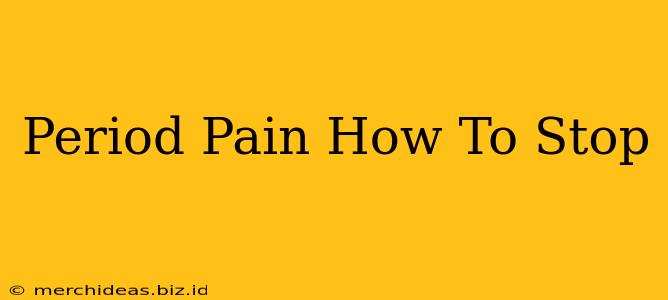Menstrual cramps, or period pain, are a common experience for many women, but that doesn't mean you have to suffer in silence. Severe period pain can significantly impact your daily life, making even simple tasks feel overwhelming. This comprehensive guide explores effective strategies to manage and even stop period pain, helping you regain control and live a more comfortable life.
Understanding Period Pain: Causes and Symptoms
Before diving into solutions, it's crucial to understand why you experience period pain. The primary cause is usually prostaglandins, hormone-like substances released during menstruation. These chemicals cause the uterus to contract, leading to cramping. High levels of prostaglandins are often associated with more intense pain.
Symptoms of period pain can vary widely, but commonly include:
- Cramping: This is the most common symptom, ranging from mild discomfort to debilitating pain.
- Lower back pain: Pain may radiate to the lower back and thighs.
- Headaches: Some women experience migraines or tension headaches alongside menstrual cramps.
- Nausea and vomiting: Severe pain can sometimes lead to nausea and vomiting.
- Fatigue: Feeling unusually tired and lethargic is also a common symptom.
- Diarrhea: Changes in bowel movements are also possible.
Effective Strategies to Stop Period Pain
Fortunately, numerous strategies can help alleviate or even eliminate period pain. Let's explore some of the most effective options:
1. Over-the-Counter Pain Relief
Nonsteroidal anti-inflammatory drugs (NSAIDs) like ibuprofen (Advil, Motrin) and naproxen (Aleve) are highly effective in reducing period pain. These medications work by reducing prostaglandin production. Always follow the dosage instructions on the label.
2. Heat Therapy
Applying heat to your lower abdomen or lower back can help relax the uterine muscles and reduce cramping. You can use a heating pad, hot water bottle, or even a warm bath or shower.
3. Lifestyle Changes
Several lifestyle adjustments can significantly impact period pain:
- Regular Exercise: Moderate exercise, such as walking or yoga, can help reduce pain and improve overall well-being.
- Healthy Diet: A balanced diet rich in fruits, vegetables, and whole grains can contribute to better hormone regulation. Limiting caffeine and processed foods may also help.
- Stress Management: Stress can exacerbate period pain. Practicing stress-reducing techniques such as meditation, deep breathing exercises, or yoga can be beneficial.
- Sufficient Sleep: Aim for 7-8 hours of quality sleep each night to support hormone balance and overall health.
4. Alternative Therapies
Some alternative therapies have shown promise in managing period pain:
- Acupuncture: This traditional Chinese medicine technique involves inserting thin needles into specific points on the body.
- Massage: Gentle massage of the lower abdomen can help relax muscles and reduce cramping.
- Herbal Remedies: Certain herbal remedies, such as chamomile or ginger, may have pain-relieving properties. Consult a healthcare professional before using herbal remedies.
5. Medical Intervention
If over-the-counter pain relievers and lifestyle changes aren't enough to manage your period pain, consult a doctor or gynecologist. They may recommend stronger pain medication, hormone therapy, or other interventions depending on the underlying cause and severity of your pain. Conditions like endometriosis or adenomyosis can cause severe period pain and require specialized treatment.
When to Seek Medical Attention
While many women experience mild period pain, it's essential to seek medical attention if your pain is:
- Severe and debilitating: If pain interferes significantly with your daily life.
- Accompanied by heavy bleeding: Excessive bleeding may indicate an underlying problem.
- Worsening over time: If your period pain is getting progressively worse.
- Associated with other symptoms: Unusual symptoms such as fever, chills, or unusual vaginal discharge warrant a doctor's visit.
Don't suffer in silence. Effective strategies exist to manage and even eliminate period pain. By understanding the causes and implementing the right approach, you can reclaim your life and experience greater comfort during your menstrual cycle. Remember to consult with a healthcare professional for personalized advice and treatment.
